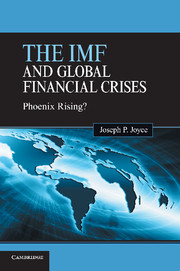Book contents
- Frontmatter
- Contents
- List of Figures, Tables, and Boxes
- Preface
- Acknowledgments
- Abbreviations
- 1 Introduction
- 2 Bretton Woods
- 3 Transitions
- 4 The Debt Crisis
- 5 Global Finance Redux
- 6 Currency Crises
- 7 The Widening Gyre
- 8 Fiscal Follies
- 9 Lessons Learned
- 10 The Great Recession
- 11 The World Turned Upside Down
- Appendix: IMF Data
- References
- Index
- References
9 - Lessons Learned
Published online by Cambridge University Press: 05 December 2012
- Frontmatter
- Contents
- List of Figures, Tables, and Boxes
- Preface
- Acknowledgments
- Abbreviations
- 1 Introduction
- 2 Bretton Woods
- 3 Transitions
- 4 The Debt Crisis
- 5 Global Finance Redux
- 6 Currency Crises
- 7 The Widening Gyre
- 8 Fiscal Follies
- 9 Lessons Learned
- 10 The Great Recession
- 11 The World Turned Upside Down
- Appendix: IMF Data
- References
- Index
- References
Summary
The crises in Argentina and Turkey proved to be the last of the wave of financial crises in emerging market economies that had begun in Mexico in 1994. The postcrisis period was used by the IMF and its members to engage in investigations of the causes of the crises and evaluations of the IMF’s responses. This chapter presents on overview of the different lessons that the Fund and its members drew on how to counter the excessive volatility in financial flows and markets.
The IMF reassessed its crisis prevention and management policies and implemented a series of changes that are summarized in the first section. The Fund became more cautious in its approach to capital account deregulation and urged its members to implement regulatory and supervisory reforms before removing the barriers to capital inflows. But it continued to present an open capital account as the goal that middle- and low-income countries should pursue. Similarly, the IMF announced that it would apply conditions to its loans more sparingly, although the evidence on whether it adhered to this new policy is ambiguous. The Fund also attempted to develop new mechanisms for its own governance and to deal with sovereign defaults, but these initiatives were not accepted by its members.
- Type
- Chapter
- Information
- The IMF and Global Financial CrisesPhoenix Rising?, pp. 134 - 152Publisher: Cambridge University PressPrint publication year: 2012

